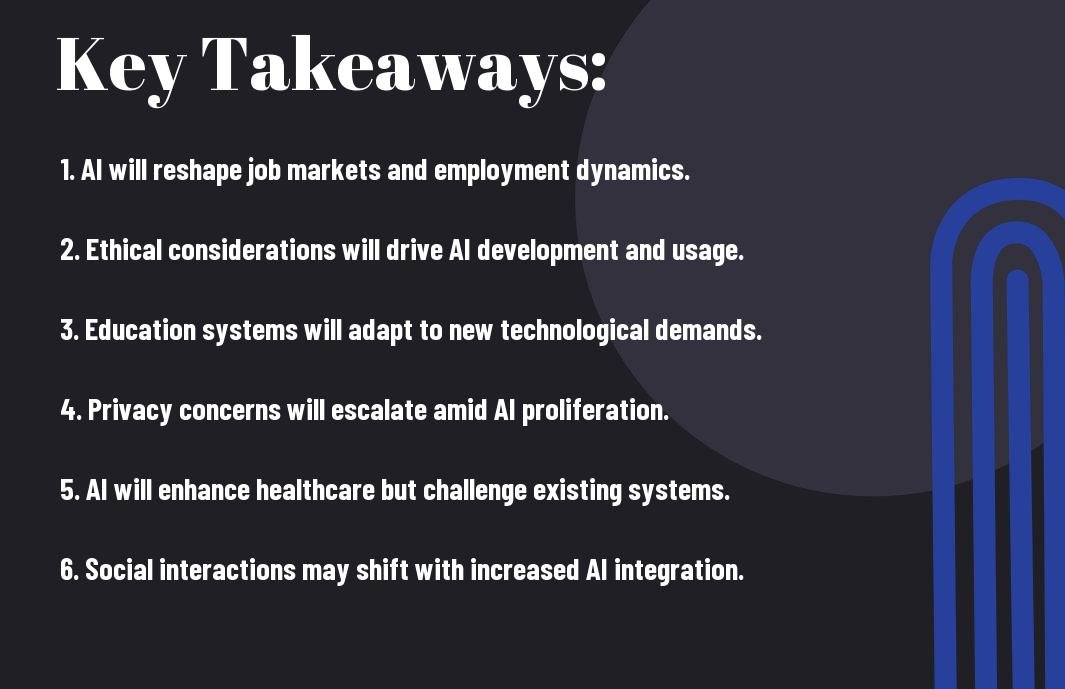Many experts believe that by 2025, artificial intelligence will significantly reshape your daily life, work environment, and social interactions. As AI technologies continue to advance and infiltrate various sectors, you may find yourself navigating a world where automated systems influence everything from job opportunities to decision-making processes. In this blog post, we’ll explore the possible transformations AI could bring to society, examine both its benefits and challenges, and help you understand how to adapt to this rapidly evolving landscape.


The Current State of AI Technology
The current landscape of AI technology is evolving at an unprecedented pace, impacting numerous sectors and reshaping traditional processes. Innovations in machine learning, natural language processing, and robotics have enabled systems to analyze data more efficiently than ever before. As organizations invest in AI-driven solutions, you will see a transformation in the way we work and live, creating both opportunities and challenges that society must navigate.
Advances in Machine Learning
Around the globe, advancements in machine learning are equipping computers with the ability to learn from data and improve their performance autonomously. Techniques such as deep learning and neural networks have fueled breakthroughs, allowing applications to recognize patterns, make predictions, and even generate creative content. You might find these technology enhancements underlying platforms that cater to your needs, increasing efficiency and accuracy across various fields.
AI in Everyday Life
Across your daily routines, AI has seamlessly integrated into many aspects of life, enhancing convenience and efficiency. From voice-activated assistants that help manage schedules to personalized recommendations on streaming platforms, these intelligent systems analyze your habits and preferences to enhance your experiences. This growing presence of AI technology signifies a shift in how you interact with digital tools.
Another noteworthy aspect of AI in your everyday life is its role in improving health care. With AI algorithms analyzing medical data and predicting patient outcomes, doctors can provide personalized treatment plans, ultimately enhancing your overall health experience. Furthermore, AI solutions are becoming integral in industries such as transportation and finance, automating processes and improving service delivery. As these technologies continue to evolve, your relationship with AI will deepen, fundamentally altering how you approach various facets of life.
Societal Impacts of AI
One of the most profound changes you may witness by 2025 is the societal transformation instigated by AI. Innovations in technology could reshape how you engage with your community and influence overall social dynamics. From redefining your interactions to altering the economic landscape, the implications are vast. For a deeper analysis, check out How AI will trigger the next ‘end of history’.
Employment and Workforce Dynamics
One thing you should consider is how AI will disrupt employment and workforce structures. Job functions are evolving rapidly, and roles that were once deemed secure may soon be automated. This shift means you will need to adapt and acquire new skills to stay relevant in an increasingly competitive job market.
Ethical Considerations and Bias
Considerations around ethics and bias are pivotal as AI technologies become more integrated into your daily life. The algorithms driving decisions could unintentionally perpetuate existing biases, affecting how you experience services and opportunities. This raises questions about accountability and the fairness of automated systems.
Employment in an AI-driven world will require vigilance and the willingness to confront biases that may arise in algorithmic decision-making. As AI systems analyze data, they might reflect historical inequalities, potentially skewing hiring practices or loan approvals. You must advocate for transparent and equitable AI development to ensure fair treatment in all aspects of life.
AI in Governance and Decision-Making
After integrating AI into governance, you may find decision-making processes becoming faster and more data-driven. This technology can analyze vast amounts of data and provide insights that lead to more informed policy choices. As AI continues to evolve, your government might utilize these tools to enhance efficiency and address complex societal issues more effectively, reshaping how policies are created and implemented.
Policy Implications
After AI becomes more entrenched in governance, you will likely see shifts in policy frameworks to accommodate this technology. Laws may evolve to address ethical concerns, data privacy, and the implications of algorithm-driven decisions. As a citizen, your voice in these matters will become increasingly important, ensuring that AI serves the public interest while considering potential risks and benefits.
Transparency and Accountability
Above all, transparency and accountability in AI governance will shape public trust in these systems. You may expect clear reporting on how AI tools influence decision-making, detailing their methodologies and outcomes. This openness can empower your participation in democratic processes, ensuring that AI developments benefit society as a whole.
For instance, if a local government uses AI algorithms to allocate resources or assess community needs, you will want to know how those algorithms are developed, what data is used, and how decisions are made possible. Transparency helps you understand the rationale behind policy initiatives, while accountability mechanisms can ensure that any biases or errors in AI systems are addressed promptly. In doing so, trust in these technological advancements can grow, ultimately leading to a more equitable and inclusive governance structure.
The Role of AI in Healthcare
To understand the transformative impact of AI on healthcare, you must recognize its potential to enhance patient diagnosis, streamline operations, and personalize treatment plans. By integrating advanced algorithms and machine learning, AI systems can analyze vast amounts of data, providing healthcare professionals with critical insights that improve patient outcomes and reduce costs.
Innovations and Benefits
At the forefront of healthcare advancements, AI introduces innovative solutions such as predictive analytics and telemedicine, which empower you to access timely medical advice from the comfort of your home. By leveraging these technologies, you can benefit from more precise diagnoses, optimized treatment plans, and better overall patient engagement.
Challenges and Limitations
The integration of AI in healthcare faces several challenges, including data privacy concerns, technological disparities, and concerns about the accuracy of AI-driven decisions. These limitations can impact your trust in AI systems and raise questions about their reliability in critical healthcare scenarios.
Consequently, addressing these challenges is vital for successful AI implementation. You may find yourself confronting potential biases in algorithms, unequal access to technology, and the need for regulatory frameworks to ensure patient safety. It’s imperative to advocate for transparency and ethical guidelines that can help build trust and security in AI applications while empowering you to engage confidently with these technological innovations.

Education and AI: A New Paradigm
Despite the excitement surrounding AI’s potential, its integration into education presents both opportunities and challenges. As educators and institutions adapt to new technologies, you may find yourself navigating a landscape that fosters personalized learning experiences and innovative teaching methodologies. By embracing AI tools, you can enhance your educational journey, catering to diverse learning styles and needs.
Transformative Learning Experiences
Paradigm shifts in education are being driven by AI, enabling you to engage with customized curricula that adjust based on your learning pace and preferences. Through intelligent tutoring systems and immersive simulations, these experiences become more interactive and engaging, leading to deeper understanding and retention of knowledge.
Equity and Access Issues
With the rapid advancement of AI in education, disparities in access and resources can impede progress. It’s important for you to consider how these technologies can be equitably distributed, ensuring that all students, regardless of their background, can benefit from the rich possibilities AI affords.
The growing reliance on AI in education raises important questions about access to technology and the internet. For many students, especially in underprivileged areas, limited resources can create barriers to AI-enhanced learning. This digital divide may perpetuate existing inequalities, leaving some students at a disadvantage. As you reflect on this issue, you should advocate for policies and initiatives that promote equal access to AI tools, ensuring that innovations in education uplift every learner, rather than widening the gap. Ensuring equitable opportunities is important for a future where AI positively impacts all of society.
Future Scenarios: Predictions for 2025
Not every scenario by 2025 will see AI as a purely positive force. Instead, you may find a blend of advancements and challenges that could reshape your everyday life. For a deeper exploration, consider checking this discussion on how society and economics change due to AI.
Best-Case Scenarios
Predictions suggest that by 2025, AI will enhance productivity and innovation, leading to breakthroughs in education, healthcare, and transportation. You might benefit from personalized learning experiences, quicker medical diagnoses, and smarter cities, all driven by advanced AI technologies.
Potential Risks and Outcomes
Between the benefits, unanticipated challenges may arise, including job displacement and privacy concerns. The rise of AI could result in significant economic shifts, as entire industries adapt or dissolve, leaving you to navigate a transformed job landscape.
Scenarios of AI integration by 2025 will not be without risks. You may experience societal polarization as those who adapt swiftly to technological changes flourish, while others face obsolescence. There’s also the threat of widespread misinformation and cyber threats, which could undermine trust and safety in your digital interactions. As the balance tilts, it is important to remain vigilant and proactive to ensure a future where AI enriches, rather than disrupts, your life.
Summing up
From above, it’s clear that AI has the potential to significantly influence various aspects of your daily life and societal structures by 2025. As technology advances and becomes more integrated into your work, education, and social interactions, you will need to adapt to these changes. The redefinition of traditional boundaries and norms will require you to embrace innovative tools and practices, paving the way for a future where AI and humanity coexist in a transformed landscape.









